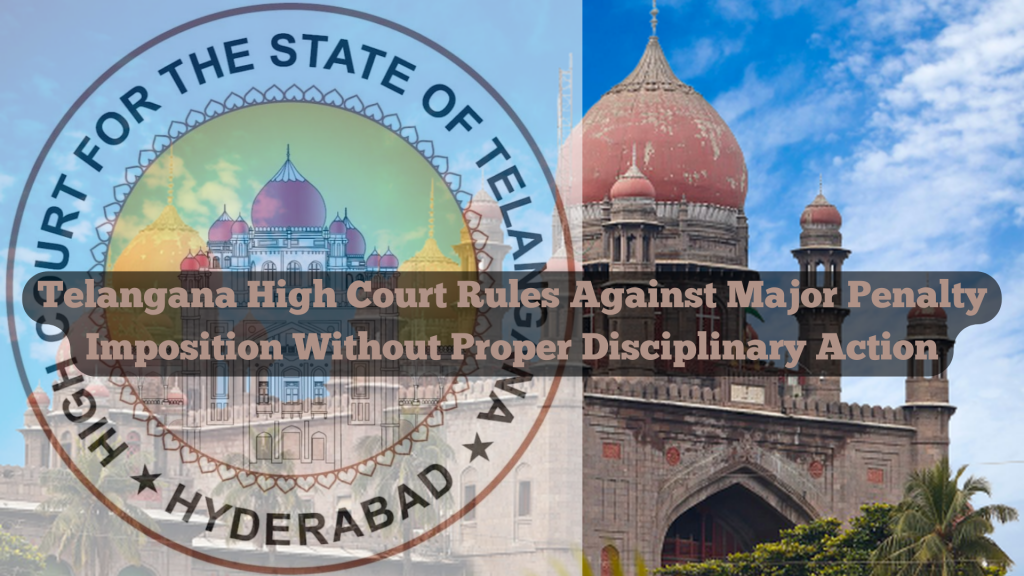
Telangana High Court Sets Aside Major Penalty Of Removal In Disciplinary Action
Judgement Given On : 16/03/2021
Background
In the case of Duraisamy Baskaran v. GAIL (India) Limited and Ors., the Telangana High Court issued a significant ruling on March 16, 2021, setting aside the orders of removal from service imposed by the disciplinary authority and confirmed by the appellate authority. The court found that these punitive measures had been taken without the proper initiation of disciplinary proceedings against the petitioner, Duraisamy Baskaran.
Duraisamy Baskaran had initially been appointed as Deputy Manager at GAIL (India) Limited, a public sector enterprise. He claimed that he was entitled to promotion to E-6 Grade from April 1, 2009, but his case had not been considered by the organization. In response, he filed a Writ Petition before the High Court of Madras, which was still pending.
Baskaran contended that due to his raising concerns about corruption and illegalities within the organization, he had become the target of multiple transfers. Furthermore, he alleged that the organization falsely implicated him in a sexual harassment case involving contract female workers in Hyderabad. This case was referred to the Internal Complaints Committee (ICC) established under the Prevention of Sexual Harassment Act, 2013.
The preliminary investigation by the ICC resulted in a report, which was submitted to the disciplinary authority. The ICC found some of the allegations against Baskaran to be proven, while others were not. During this process, Baskaran was placed under suspension under Rule 25 of the GAIL Employees’ (CDA) Rules, 1986. Subsequently, a charge memo was issued to Baskaran in accordance with Regulation 30 of the GAIL Employees (Conduct, Discipline, and Appeal) Rules, 1986. However, a major penalty of removal from service was immediately imposed on him, which led to his appeal being rejected by the appellate authority.
Key Findings of the Court
The Telangana High Court made the following key findings in its judgment:
- Proper Disciplinary Proceedings Required: The disciplinary authority was obligated to initiate disciplinary proceedings against Baskaran. Following the completion of these proceedings and the provision of due opportunities to the petitioner, penalties could be imposed. However, bypassing this procedure, the respondents should not have imposed the severe penalty of removal directly.
- Violation of Regulation 30: Imposing a major penalty of removal from service on Baskaran without adhering to the provisions of Regulation 30 of the Rules, 1986, was found to be in violation of the established regulations.
- Disciplinary Action Initiation: The court emphasized that disciplinary action should have been initiated against Baskaran after the ICC’s report findings. These findings were to be treated as part of the disciplinary inquiry against him and should have been acted upon accordingly.
- Regulation 30 Compliance: Regulation 30 of the Rules, 1986, is considered substantive law and mandates that major penalties specified in Regulation 28 should not be imposed without conducting an inquiry in accordance with this rule. The respondents’ failure to follow this substantive requirement was deemed significant.
- Prejudice Due to Violation: The court held that the violation of substantive law in Regulation 30 raised the issue of whether any prejudice had been caused to the petitioner. In this case, the respondents had clearly violated the substantive requirement of Regulation 30.
Conclusion
The Telangana High Court’s ruling underscores the importance of adhering to proper disciplinary procedures and regulations when imposing major penalties such as removal from service. The court held that disciplinary authorities should initiate disciplinary proceedings, provide opportunities for a fair inquiry, and only then impose penalties if the charges are proven. The judgment serves as a reminder of the principles of natural justice and the need to follow established rules and procedures when dealing with disciplinary actions in the workplace.
